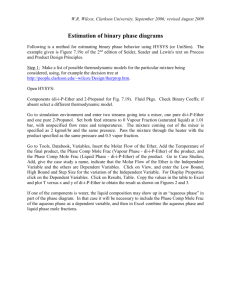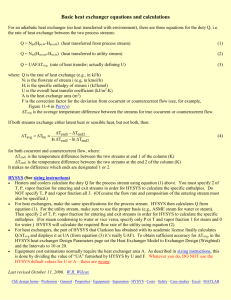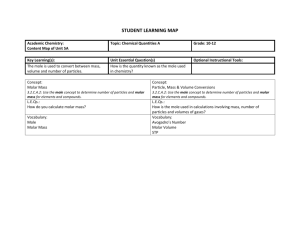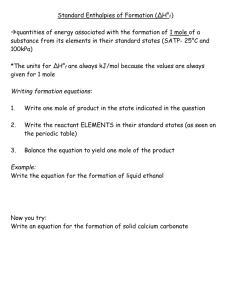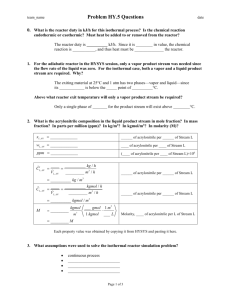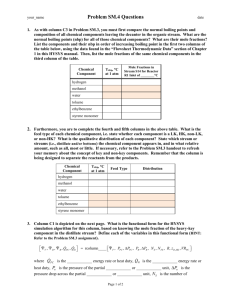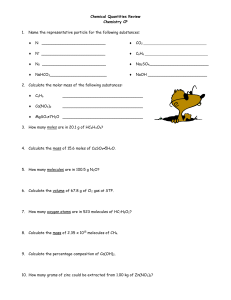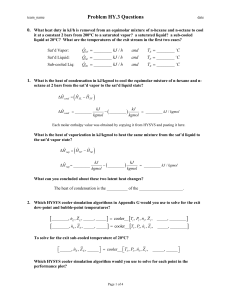Click here
advertisement
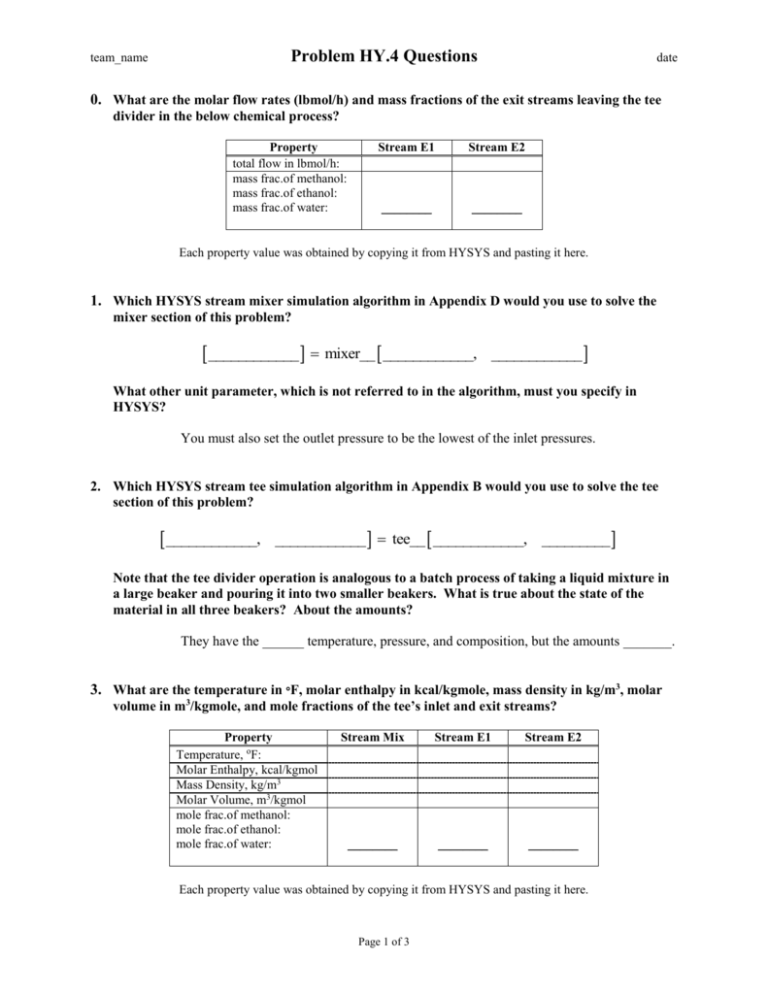
Problem HY.4 Questions team_name date 0. What are the molar flow rates (lbmol/h) and mass fractions of the exit streams leaving the tee divider in the below chemical process? Property total flow in lbmol/h: mass frac.of methanol: mass frac.of ethanol: mass frac.of water: Stream E1 Stream E2 ________ ________ Each property value was obtained by copying it from HYSYS and pasting it here. 1. Which HYSYS stream mixer simulation algorithm in Appendix D would you use to solve the mixer section of this problem? ____________ mixer__ ____________, ____________ What other unit parameter, which is not referred to in the algorithm, must you specify in HYSYS? You must also set the outlet pressure to be the lowest of the inlet pressures. 2. Which HYSYS stream tee simulation algorithm in Appendix B would you use to solve the tee section of this problem? ____________, ____________ tee__ ____________, _________ Note that the tee divider operation is analogous to a batch process of taking a liquid mixture in a large beaker and pouring it into two smaller beakers. What is true about the state of the material in all three beakers? About the amounts? They have the ______ temperature, pressure, and composition, but the amounts _______. 3. What are the temperature in F, molar enthalpy in kcal/kgmole, mass density in kg/m3, molar volume in m3/kgmole, and mole fractions of the tee’s inlet and exit streams? Property Temperature, oF: Molar Enthalpy, kcal/kgmol Mass Density, kg/m3 Molar Volume, m3/kgmol mole frac.of methanol: mole frac.of ethanol: mole frac.of water: Stream Mix Stream E1 Stream E2 ________ ________ ________ Each property value was obtained by copying it from HYSYS and pasting it here. Page 1 of 3 Problem HY.4 Questions team_name date What is unique about these values? All of these property values for the tee inlet and exit streams are the ________. What are the temperature, molar enthalpy, mass density, molar volume and mole fractions, in the same units, of the mixer’s inlet and exit streams? Property Temperature, oF: Molar Enthalpy, kcal/kgmol Mass Density, kg/m3 Molar Volume, m3/kgmol mole frac.of methanol: mole frac.of ethanol: mole frac.of water: Stream Alcohol Stream Water Stream Mix ________ ________ ________ Each property value was obtained by copying it from HYSYS and pasting it here. How do these values for the mixer streams differ from those for the tee? Why? The property values of the mixer inlet and exit streams are __________________. The tee divides one stream into two identical streams with only __________________. The mixer combines two unlike inlet streams into __________________________. 4. What is the material relative imbalance (%RIB) for the process flowsheet? Show your calculations. The material %RIB equals 100*(mass flow in – mass flow out) / (mass flow in). You are to draw an overall system boundary around the flowsheet, which contains the mixer and tee operations. The only material and energy streams you are to consider in your imbalance calculation are those that cut your overall system boundary. Therefore, you would not consider Stream Mix in your calculations. % RIBMB _________________ mA mW 100 ________ +________ ________ ________ kg/h 100 ________ +________ kg/h ______ % RIBMB % RIBMB Each total flow value was obtained by copying it from HYSYS and pasting it here. Page 2 of 3 Problem HY.4 Questions team_name date 5. What is the energy relative imbalance (%RIB) for the process flowsheet? Show your calculations. The energy %RIB equals 100*(energy flow in – energy flow out) / (energy flow in). % RIBEB _________________ E A EW 100 __________ __________ __________ __________ kJ/h 100 __________ __________ kJ/h % RIBEB __________ % RIBEB Each energy flow value was obtained by copying it from HYSYS and pasting it here. In the HYSYS software, the Mass/Energy Balance page within the Flowsheet/Flowsheet Summary menu provides the relative imbalances for material and energy. Page 3 of 3
